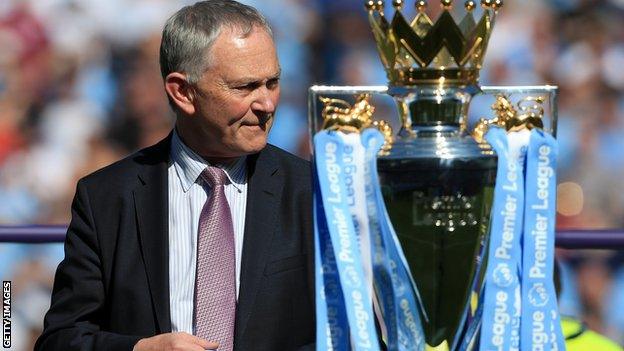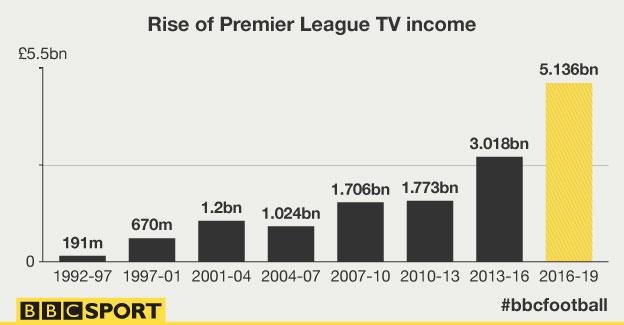Richard Scudamore: Premier League chief to stand down by end of 2018
- Published
- comments

Richard Scudamore is a former chief executive of the Football League
Premier League executive chairman Richard Scudamore is to stand down by the end of 2018 after nearly 20 years as head of the organisation.
The 58-year-old was appointed in November 1999 and has overseen a period of sustained growth.
The league's UK television rights were valued at about £670m when he joined, and the last deal was worth £5.14bn.
"It's an absolute privilege to have been allowed to enjoy this role for so long," said Scudamore.
"It is too much fun to be called a job.
"Football is an intoxicating environment and therefore difficult to give up being so involved, but my passion for what football means to so many and the positive impact it can make will never diminish."
Scudamore kept his decision secret from the clubs, only announcing it at their end-of-season meeting on Thursday when the agenda reached "any other business", the BBC's sports news correspondent Richard Conway says.
It appears the only people aware of his decision were Bruce Buck, the Chelsea chairman and head of the league's audit and remuneration committee, and two of the league's independent directors.
The announcement came on the day it was revealed online streaming service Amazon had won the rights to show 20 Premier League matches a season for three years from 2019.
The package had been designed to appeal to internet giants such as Amazon, Netflix, Apple, Facebook and Google, although the auction fell short of the Premier League's hopes on revenue.
The income for 200 matches available across seven packages in total is not expected to exceed the £5.14bn brought in from 168 games in 2015.

'A significant reign' - analysis
BBC sports editor Dan Roan
Given the astonishing riches, global popularity, and cultural influence achieved by the Premier League under his leadership, Richard Scudamore steps down having become arguably the most important and powerful figure in British sport.
Thanks in part to his ruthlessness, intellect, and diplomacy when dealing with club owners, TV executives or politicians, the league remained united, and generated unprecedented fortunes, principally for the players and their agents. He also shared in the success of course, becoming one of the highest paid administrators in British sport.
The bounty also benefited the grassroots of the game, Football League clubs, and good causes, although not to the extent that many would have liked during a period when the divide between the top of the game - and the rest, including the fans and those who struggle to play on facilities up and down the country - seemed to grow starker than ever.
Scudamore's tenure was not without controversy.
He had to admit defeat over the ill-fated idea of a '39th game', and apologised in 2014 over sexist comments in emails. Many critics believed increasing numbers of foreign owners and overseas playing talent also contributed to England's woeful record at major tournaments, and feared the league's power under Scudamore stripped too much authority from the Football Association.
His job, however, was to act in the best interests of the clubs he represented. And to that extent, his longevity is testament to a hugely successful and significant reign.
With the media landscape shifting, and the richest clubs jostling for more money, whoever replaces Scudamore may find the task of emulating him a challenging one.

Premier League expects 'seamless transition'
Scudamore was a senior executive at the Thomson newspaper group before moving into football in 1997, when he became chief executive of the Football League.
Two years later he moved to the Premier League.
"This past 20 years would not have been possible without the continuing support and encouragement of the clubs and the unstinting efforts of my colleagues at the Premier League," Scudamore added.
"We could not have achieved so much without the enormous commitment of broadcast and commercial partners across the world. That number will run into hundreds. They have all contributed to our story and I would like to thank them enormously."

Income generated from Premier League UK TV rights has grown significantly under Scudamore's leadership. The precise figure for the next deal, covering the period 2019-2022, has not yet been announced
Buck, meanwhile, said work had already begun on replacing Scudamore.
"We expect to make an appropriate appointment in good time so there can be a seamless transition," he said.
"I speak for all the clubs when I say we are very sorry that Richard will be leaving, but we could not have asked for anything more from him. For 20 years he has led the Premier League with distinction.
"Whilst probably best known for the outstanding growth he has delivered, most importantly he commands the respect of everyone in football for the dignified and positive way he has managed the complexities of keeping the league together and moving us forward.
"The Premier League certainly will go on from strength to strength; we also hope that Richard enjoys a very healthy and successful future.
"When he eventually leaves later in the year it will be with our sincerest thanks and gratitude for a job well done."
Analysis
BBC sports news correspondent Richard Conway
The Premier League's phenomenal growth has been driven by Richard Scudamore's negotiation skills with broadcasters and his personal relationship with the clubs which ensured a collective bargaining approach and an egalitarian sharing of profits.
He's also a fierce champion of the league's competitive balance, marketing the football as exciting and with the potential for unpredictable results.
The challenge now will be for the clubs to find someone who can effectively replace him.
The job requires an almost unique set of skills - being able to demonstrate fierce commercial acumen while balancing the political nous to keep increasingly powerful clubs onside and navigate the corridors of power at Uefa, Fifa, Ofcom, Whitehall, the FA, EFL, EU etc.
There are few jobs in the sports industry quite like it.